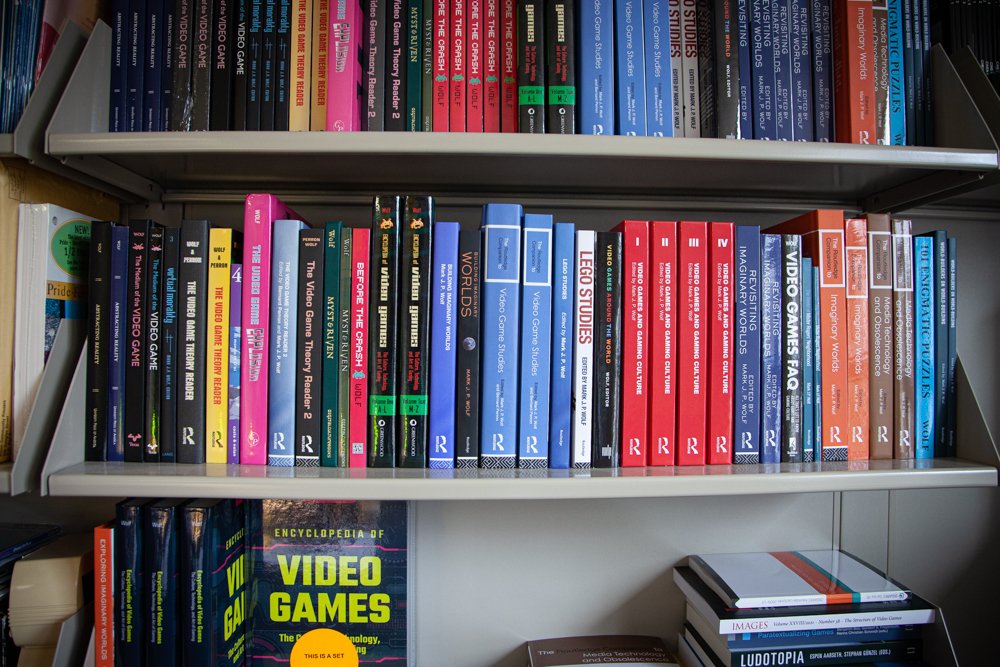
When the word “prolific” comes to mind, the name “Mark J.P. Wolf” should not be far behind.
To-date, Dr. Mark J. P. Wolf, professor of communication at Concordia University Wisconsin, has published 23 books, with two more in the works and under contract—not even counting the novel he’s finalizing. As author, co-author, or editor, his subject matter ranges from video games, puzzles, and imaginary worlds to media technology, morals and ethics, and even Mr. Rogers’ Neighborhood.
His most recent book was the three-volume Second Edition of the Encyclopedia of Video Games: The Culture, Technology, and Art of Gaming (May 2021). Next on the way is 50 Key Video Games, by Wolf and three co-editors. Also in the works is the Routledge Companion to Video Game Studies, Second Edition.
We asked him to reflect on his books, his passion for video games, the writing process, and more.
What is your most recent book project about—and why are you writing it?
Well, if you include works-in-progress, it is a book on the history of computer graphics and Hollywood cinema. I have long been interested in both topics, especially since I remember seeing a lot of the CG developments in my student days at USC in the late 1980s and early 1990s. And there’s no book out covering the topic; there’s some covering individual companies, some anecdotal histories that are far from being complete, and more journalistic books that don’t go very in-depth. This book tries to cover the whole history, and the techniques themselves, explaining how they work, just short of the math involved.
Many of your books are very academic in nature. Are any for more general audiences?
Two of them are: Video Games FAQ (2017) is a history of video games written for a general audience, and 101 Enigmatic Puzzles: Fractal Mazes, Quantum Chess, Anagram Sudoku, and More (2020) is a book of puzzles for the general public. These are not easy puzzles, but anybody can enjoy them.
You have degrees from the prestigious School of Cinematic Arts at the University of Southern California. Did you aspire to become a filmmaker?
I did. Coming out of high school I wanted to be a movie director, or at least work for ILM (Industrial Light & Magic). I went to UW-Milwaukee for two years, as a film major, and then transferred to USC to their film school. After living in Los Angeles for a while, I decided I didn’t want to spend the rest of my life living there, so I finished my M.A. and Ph.D. there then came back here to teach.
How did you get interested in writing about video games?
I initially started writing about them because they had some similarities with cinema, and having grown up with the early video games, I knew something about them. I wrote a piece on them that made it into Film Quarterly, where my dissertation chair, Marsha Kinder, was on the board, and apparently there was some argument among the board as to whether or not they should even publish something on video games. But Marsha argued they should do it, and in the end they did. That led to a short book on video games, and after that, presses were asking me for books on the topic.
Does the study of video games deserve more respect in academic circles?
Yes!
What’s the most important video game of all time?
I wouldn’t say that there is one single game that can claim to be the most important; there have been many that popularized games or advanced the technology. It was even difficult to choose 50 games when I and my co-editors were putting together 50 Key Video Games.
Is becoming a published author something you always saw yourself doing?
I have a novel that I am going through one last time before I publish it with Bookbaby. A friend and I started working on the story for it in 1985, so it has been in progress a long time. I guess I hoped back then to actually get it published, so I guess I could say yes, I thought about that since at least 1985. But of course I had no idea I would do all those academic books!
Who are your own favorite authors—and why?
When It comes to fiction, J. R. R. Tolkien is my favorite author; his work inspired me, and The Lord of the Rings (1954-1955) is my favorite novel. He did an incredible job of world-building, and really set a standard for imaginary worlds in literature.
What are you reading now?
Mostly books and articles for my book on the history of computer graphics and Hollywood cinema. For spiritual reading, The Life of Jesus Christ and Biblical Revelations from the visions of Blessed Anne Catherine Emmerich.
Have you always been a prolific writer?
I’ve always had lots of projects going, though not all of them are (or were) books. My first book, which was a revision of my dissertation, was published in 2000. Then there’s the computer graphics book and the novel that I mentioned which are both underway. I also have a second novel I may do something with, a genealogical family history book, and two academic books which are only in outline form. I also have designed a few board games.
What’s the most challenging part of the book-writing process?
For fiction, it’s getting a publisher; very hard to do. It’s much easier to get an academic book published. The most challenging aspects of it would be some of the details that people probably don’t think about—getting image permissions, having to index the book, page by page, checking proofs, things like that; the drudge work. But these come after you have a book written and accepted by a publisher, so at least at that point you have the motivation to get it done, since the book is in its final stages before coming out.
What tips do you have for aspiring authors?
Get started! Write an outline, experiment, get going on the idea. Choose something no one’s ever done before, and something you are really interested in and uniquely positioned to write about.
For more information about communication studies at Concordia University Wisconsin, visit the Department of Communication at cuw.edu.
The complete works of Dr. Mark J. P. Wolf (so far):
- Encyclopedia of Video Games: The Culture, Technology, and Art of Gaming, Second Edition, editor (three volumes, 518 entries, 186 contributors), author of 63 entries, co-author of 5 entries, Santa Barbara, California: ABC-CLIO/Greenwood Press, May 2021. [Solicited by the press]
- Exploring Imaginary Worlds: Essays on Media, Structure, and Subcreation, editor and essay contributor (“Our World: World-Building in Thornton Wilder’s Our Town”), New York, New York: Routledge, November 2020.
- World-Builders on World-Building: An Exploration of Subcreation, editor and essay contributor (“Concerning the “Sub” in “Subcreation”: The Act of Creating Under” and “Types of World-Building”), New York, New York: Routledge, June 2020.
- 101 Enigmatic Puzzles: Fractal Mazes, Quantum Chess, Anagram Sudoku, and More, South Milwaukee, Wisconsin: Aurochs Press, March 2020.
- The Routledge Companion to Media Technology and Obsolesence, editor and essay contributor (“Farewell to the Phosphorescent Glow: The Life of the Cathode Ray Tube”), New York and London: Routledge, December 2018. Winner of the Society for Cinema and Media Studies (SCMS) Best Edited Collection Award for 2020.
- The Routledge Companion to Imaginary Worlds, editor and essay contributor (“Invented Cultures”, “Narrative Fabric”, “Saviors”, “World Design”, and “Virtual Worlds”), New York and London: Routledge, October 2017. Shortlisted for the Mythopoeic Award for Myth and Fantasy Studies in 2018, 2019, and 2020.
- The World of Mister Rogers’ Neighborhood, New York, New York: Routledge, September 2017. The first book in the Imaginary Worlds book series which I founded at the press.
- Video Games FAQ, Montclair, New Jersey: Hal Leonard Performing Arts Publishing Group, July 2017. [Solicited by the press]
- Revisiting Imaginary Worlds: A Subcreation Studies Anthology, editor and essay contributor (“The Importance of Overflow and Chunking in World-Building and the Experiencing of Worlds”), New York, New York: Routledge, 2017.
- Video Games and Gaming Culture, four volumes, editor and essay contributor (reprinted material), Routledge Major Works series, New York and London: Routledge, April 2016. [Solicited by the press]
- Video Games Around the World, editor and essay contributor (“United States of America”), Cambridge, Massachusetts: the MIT Press, May 2015.
- LEGO Studies: Examining the Building Blocks of a Transmedial Phenomenon, editor and essay contributor (“Adapting the Death Star into LEGO: The Case of LEGO Set #10188”), New York, New York: Routledge, November 2014. This essay was also reprinted in Dan Hassler-Forest and Sean Guynes, editors, Star Wars and the History of Transmedia Storytelling, Amsterdam, Netherlands: Amsterdam University Press, 2018.
- The Routledge Companion to Video Game Studies, co-editor with Bernard Perron and essay contributor (“Resolution” and “Worlds”), New York, New York: Routledge, January 2014.
- Building Imaginary Worlds: The Theory and History of Subcreation, New York, New York: Routledge, November 2012.
- Encyclopedia of Video Games: The Culture, Technology, and Art of Gaming, First Edition, editor (two volumes, 313 entries, 97 contributors), author of 41 entries, and co-author of 5 entries, Santa Barbara, California: ABC-CLIO/Greenwood Press, August 2012. [Solicited by the press]
- Before the Crash: Early Video Game History, anthology editor and essay contributor (“The Video Game Industry Crash of 1977”), Detroit, Michigan: Wayne State University Press, April 2012. The book was part of the Contemporary Approaches to Film and Television Series.
- Myst & Riven: The World of the D’ni, Ann Arbor, Michigan: University of Michigan Press, 2011. The first book in the Landmark Video Game book series. A revised and updated version of The World of the D’ni: Myst and Riven, Milan, Italy: Costa & Nolan, 2006, published in Italian as a part of the Videoludica Game Culture book series. [Solicited by the series editor]
- The Video Game Theory Reader 2, anthology co-editor (with Bernard Perron), essay contributor (“Z-axis Development in the Video Game” and appendix entries), and cover designer, New York: Routledge Press, November 13, 2008. [Solicited by the press]
- The Video Game Explosion: A History from PONG to PlayStation and Beyond, anthology editor and essay contributor (16 essays and 4 sidebars), Westport, Connecticut: Greenwood Press, November 30, 2007. [Solicited by the press]
- The Video Game Theory Reader, anthology co-editor (with Bernard Perron), essay contributor (“Abstraction in the Video Game”) and designer of the background image on the book’s front cover, New York: Routledge Press, November, 2003. [Solicited by the press] Chosen as “book of the month” for March 2006 by the Resource Center for Cyberculture Studies.
- Virtual Morality: Morals, Ethics, and New Media, anthology editor and essay contributor (“From Simulation to Emulation: Ethics, Worldviews, and Video Games”), New York: Peter Lang Publishing, 2003. The book is Volume three in the Digital Formations series edited by Steve Jones. Chosen as the “book of the month” for March 2007 by the Resource Center for Cyberculture Studies.
- The Medium of the Video Game, anthology editor, contributor of five essays (“The Video Game as a Medium”, “Space in the Video Game”, “Time in the Video Game”, “Narrative in the Video Game”, and “Genre and the Video Game”), and cover designer, Austin, Texas: University of Texas Press, 2001.
- Abstracting Reality: Art, Communication, and Cognition in the Digital Age, Lanham, Massachusetts: University Press of America, 2000.
— This story is written by Mike Zimmerman, videographer/photographer for Concordia University Wisconsin. He may be reached at michael.zimmerman@cuw.edu or 262-243-4380.
If this story has inspired you, why not explore how you can help further Concordia's mission through giving.

